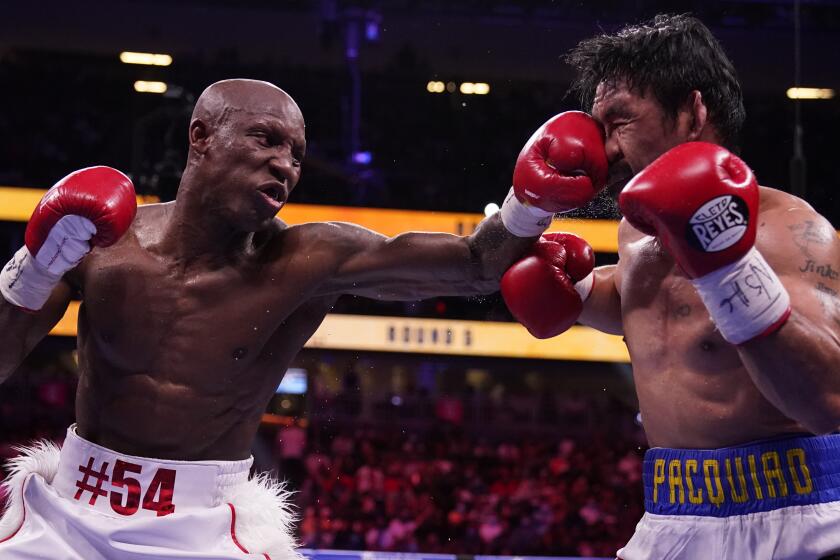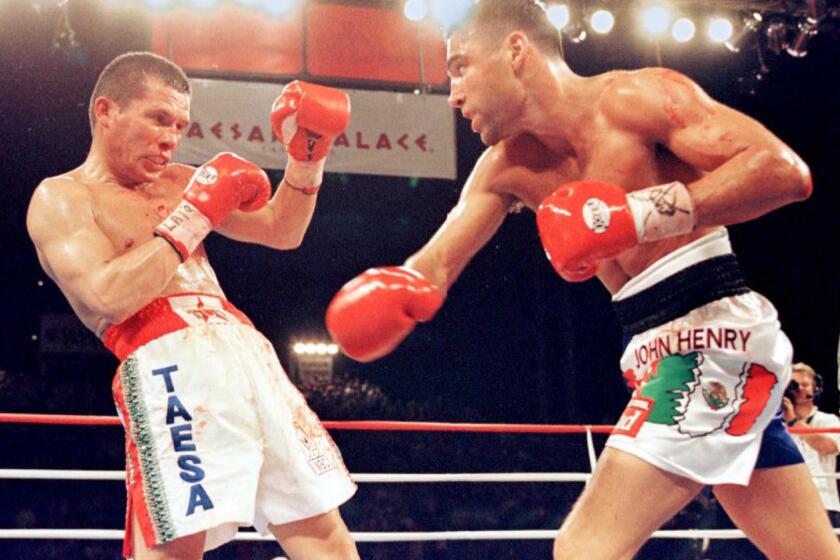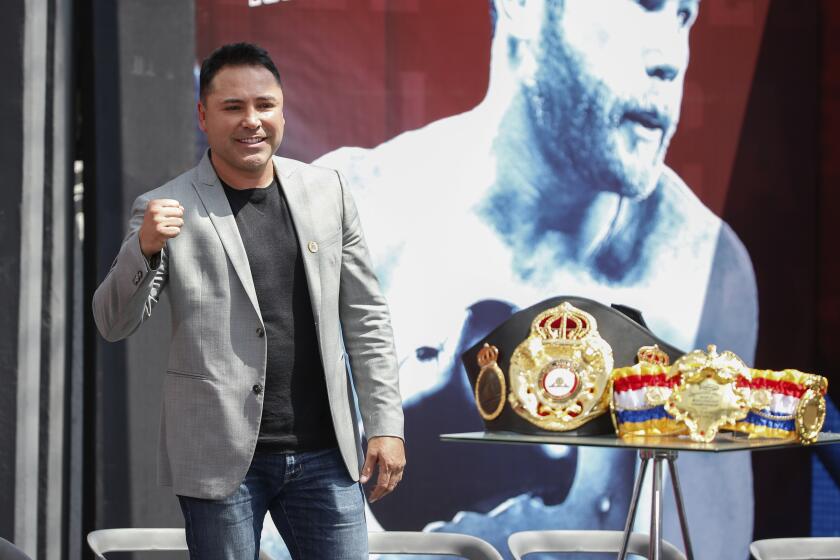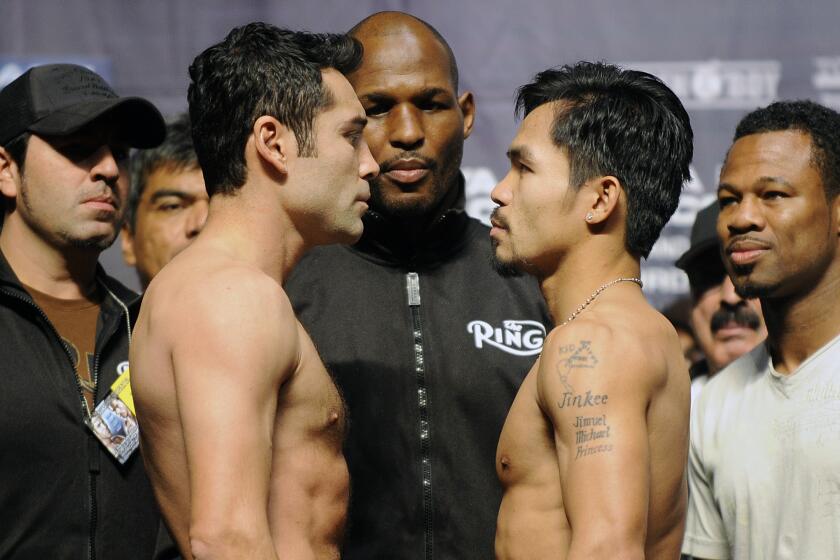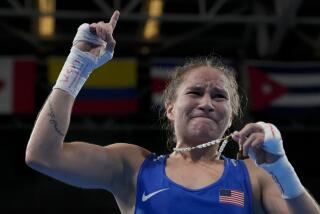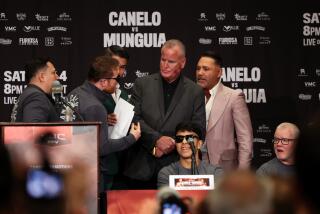Column: Oscar De La Hoya chases a statement win over Vitor Belfort — and his own demons

Oscar De La Hoya began by speaking in metaphors, describing a series of unclosed doors and visits to hell.
About 20 minutes into the conversation, he became more specific.
“I was raped at 13, from a woman, an older woman,” he said. “Thirteen, lost my virginity over being, you know, being raped, basically.”
He offered some details.
“I was in Hawaii, I think, at some tournament,” he said. “She was over 35.”’
His discomfort was evident in the increased tempo of his speech.
Manny Pacquiao’s demeanor after Saturday night’s loss to Yordenis Ugas transformed what was essentially his professional funeral into a celebration.
But De La Hoya is trying.
At 48, the former boxing champion from East Los Angeles is trying to find the serenity to accept what can’t be changed and the courage to repair what can.
Which is why he was delighted to share with a small audience at his downtown offices of how an experiment with psychedelic mushrooms last year helped him make peace with his late mother.
Which also explains why he is emerging from a 13-year retirement to take on former mixed-martial arts champion Vitor Belfort at Staples Center on Sept. 11 in the main event of a pay-per-view show.
This is the fighter’s paradox. Healing emotionally requires him to place himself in harm’s way physically. Compensating for the emptiness created by boxing makes it necessary for him to box again.
The cycle can be dangerous, but De La Hoya said he’s fighting again not to relive his past, but to find closure.
“I’m doing it for me,” he said.
Oscar De La Hoya vs. Julio César Chávez: The blockbuster fight 25 years ago featured a man who epitomized Mexican boxing and a man who’d be criticized for not being Mexican enough.
When he was the Golden Boy, he said, he was doing it for “everybody.”
“The whole world,” he said. “My kids. All the fans. It’s like, I never stopped to think, man, what about me? How do I want this to be?”
De La Hoya said he announced his retirement in 2009 with a similar mind-set, claiming he did so not because he wanted to but because he thought that’s what he was supposed to do.
“The next day, deep down inside, it’s like, why did I do that?” he said.
The news conference at L.A. Live was held four months after an embarrassing loss to Manny Pacquiao. De La Hoya was 35 at the time of the fight but came to believe it was lopsided only because he had drained himself to make the 147-pound weight limit.
His ambivalence over his retirement added yet another quandary to his list of unresolved problems, especially after he discovered there’s nothing quite like standing across the ring from the likes of Felix Trinidad and Ike Quartey.
“You try to convince yourself that life is going to get better after you retire,” he said. “Jesus, you’ve been waiting for this moment all your life. And once you’re retired, once you’re not doing what you love, there’s a big hole.”
Oscar De La Hoya’s comeback fight will take place in the Los Angeles born-and-bred boxer’s backyard at Staples Center on Sept. 11.
Fighting was a temporary distraction from his childhood traumas, which included the sexual abuse he revealed Monday and his complicated relationship with his mother.
“You suppress everything,” he said. “You’re living this life, the Golden Boy, but, oh s—, wait, that’s still there. Like I never, like, thought about it, I never processed it, I never really thought how my feelings are … until one day it just comes out, and you don’t know how to deal with it.”
He was the fighter with everything: the championships at multiple weight classes, the record purses, the looks of a lead actor, the widespread adoration.
“I have my kids,” he continued. “Have a great relationship with them. Moms are amazing. Everything’s beautiful. But inside, bro, f— burning.”
He sought refuge in alcohol and drugs. He said he was drinking in the two weeks leading up to his fight against Pacquiao, convincing himself that he wasn’t doing anything unhealthy because he was imbibing high-end red wines from Napa Valley.
Go beyond the scoreboard
Get the latest on L.A.'s teams in the daily Sports Report newsletter.
You may occasionally receive promotional content from the Los Angeles Times.
About a year ago, he decided he had to make some changes.
“I couldn’t be drinking and doing drugs and this and that,” he said. “I’m going to throw my life away, you know?”
Desperate, he tried hallucinogenic mushrooms.
“It went incredible,” he said. “It was at my house. It was with a shaman.
“The fact that that shaman came to my life at that particular [time], at that place, it happened for a reason. I feel it saved me. But it saved me only from my mom and my relationship with her.”
So, now he fights.
The temptation to return was always there. When he was a young fighter, De La Hoya always worried about what he was missing by giving so much of himself to boxing. In retirement, he discovered how vital the sport was to his very being. He admitted that what kept him from a comeback was “just fear.”
“Just scared,” he said. “Scared of what’s going to happen, scared of the outcome, scared of just pulling the trigger. I just finally said, ‘You know what? I’m going do it. I’m going to do it for myself.’”
Even now, with more than six years of hindsight, Manny Pacquiao can barely believe he made a 12-pound jump from lightweight to welterweight to fight Oscar De La Hoya.
In the 44-year-old Belfort, he will be taking on a former Ultimate Fighting Championship titleholder at 205 pounds. The officially sanctioned match will take place at 185 pounds. De La Hoya never weighed in at more than 160 pounds for any of his 46 previous fights.
Whatever the result, De La Hoya said he would be satisfied knowing he fought on his terms.
“I’m training whenever I want to train,” he said. “Yeah, there’s a schedule, but I’m training at home, where I live. I’m not going to Big Bear for three months and missing everybody and missing out.”
De La Hoya said he didn’t know whether this match would lead to another.
Regardless, he knows there will be other kinds of fights in his future.
“I have to deal with Little Oscar,” he said of the damaged part of his psyche.
There will be more traumas to overcome, more anguish to confront, more unfamiliar terrain to navigate.
Eight rounds against Belfort should feel easy by comparison.
More to Read
Go beyond the scoreboard
Get the latest on L.A.'s teams in the daily Sports Report newsletter.
You may occasionally receive promotional content from the Los Angeles Times.

